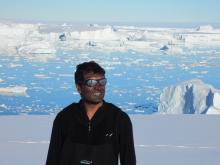As a glaciologist for over 30 years, Sridhar Anandakrishnan is well-used to social distancing. Professor of geosciences and a core member of Penn State’s Ice and Climate Exploration group, his field work in Antarctica and Greenland typically takes place in a small camp in the middle of a glacier, 1,000 miles from the closest neighbor. “For the most part,” he says, “it’s two to four people living out of a couple of tents for six to eight weeks. There’s some very particular skills one needs to navigate that kind of situation.”
The Department of Geosciences offers M.S. and Ph.D. degree programs that provide students with a broad background in any of the major areas of geological sciences and intensive research experiences culminating in the preparation of a formal thesis. The goal of the programs is to prepare students for scientific careers in academia, government, or industry. A wide range of faculty interests and exceptional laboratory and other support facilities provide an extensive variety of areas of specialization in which students may choose their course work and research topics, which include: aqueous geochemistry, chemistry and physics of rocks and mineral, geodynamics, global change and earth history, sedimentary geology and paleobiology, solid earth and applied geophysics, surficial processes.
M.S. OR PH.D. DEGREES AVAILABLE
The M.S. degree typically requires two years of study to complete and the Ph.D. (without an M.S.) about four years. Students entering with a B.S. or B.A. degrees may choose, with faculty approval, to bypass the M.S. degree and work directly for the Ph.D. Currently about a third of our students are in the M.S. program and two thirds are in the Ph.D program.
CAREERS
The goal of our programs is to prepare students for specific careers in academia, government, or industry. Students are encouraged to publish in the peer-reviewed literature as part of their dissertation research.
WHERE OUR GRADUATES FIND JOBS
- Universities
- Government agencies
- Industry
For More Information
Graduate Program Office
- Donald Fisher
Associate Head for Graduate Programs and Research
814-865-3206
dmf6@psu.edu - Jo Ann Lehtihet
Graduate Student Assistant
814-865-7394
gradprogram@geosc.psu.edu
Biogeochemistry is an interdisciplinary field that fuses biology, geosciences, and chemistry to better understand processes in nature. The program enables students from several graduate programs to gain the perspectives, techniques, and methodologies of biogeochemistry, while maintaining a close association with major program areas of study.
The following graduate programs in the college offer dual degrees in Biogeochemistry:
- Geosciences
- Materials Science and Engineering
For More Information
Contact
- Jo Ann Lehtihet
Graduate Program Assistant
814-865-7394
jxl902@psu.edu
The search for life in the universe. Exploring ancient Earth rocks that serve as examples of what could have happened to planets in different galaxies. And even analyzing and improving the tools we use to measure for evidence — either at the scale of a cell or a solar system — to answer these questions. These are the hallmarks of astrobiology research at Penn State. Our program brings together researchers from many disciplines to answer these pressing questions about the evolution of life.
The Astrobiology dual-title degree program, administered by the Department of Geosciences, enables students from several graduate programs to gain the perspectives, techniques, and methodologies of astrobiology, while maintaining a close association with major program areas of application.
At the core of Astrobiology and at the forefront of NASA goals is the construction of a fundamental scientific knowledge base that enables the recognition of signatures of life on the early Earth, in extreme environments, and in extraterrestrial settings. Graduates may work in fields devoted to the exploration of life outside of Earth and to the investigation of the origin and early evolution of life on Earth.
For More Information
Contact
- Jo Ann Lehtihet
507 Deike Building
University Park PA 16802
jxl902@psu.edu
(814) 865-7394
- Hometown:
- Hometown:
Watersheds are important landscape features that control the biogeochemistry of natural waters. This interdisciplinary minor enables students to learn the fundamental processes governing the transport and chemical evolution of surface and subsurface waters. It provides a complement to elective and required coursework in Earth sciences, resource management, wastewater treatment, and/or environmental planning. Students in this program will learn to apply fundamental concepts of chemistry, biology, geoscience, and landscape evolution to processes operating at the watershed scale. Learning objectives for the minor include excellence in written and oral expression, the ability to collect and interpret data from dynamic natural systems, and rigor in scientific thought.
The Geosciences minor provides a foundation in the physical and material aspects of the solid Earth, as well as an introduction to field techniques and technical writing. The flexible minor allows you to select from a choice of advanced courses and tailor your interests.
Some areas that graduates with the Geosciences minor may work in include Earth materials, evolution of the Earth and life, hydrogeology, environmental geology, natural hazards, plate tectonics, geophysics, and climate change.


